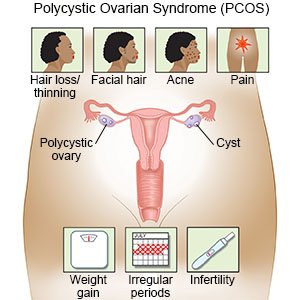Polycystic Ovarian Syndrome
Medically reviewed by Drugs.com. Last updated on Sep 23, 2025.
What is polycystic ovarian syndrome (PCOS)?
- PCOS is a group of symptoms caused by an imbalance in the male (androgens) and female (estrogens) hormones. This imbalance can stop your ovaries from working like they should. Usually, one follicle or cyst grows on the ovary each month. This follicle contains the egg. After the egg is released, the follicle goes away.
- In PCOS, many follicles form and the eggs are not released. The ovaries look like they have many cysts on them. These follicles make higher levels of the male androgen hormone and insulin that cause the symptoms of PCOS. PCOS can make it hard to get pregnant and raises your risk for endometrial cancer. It can also cause acne, weight gain, and extra hair on your face or body.
 |
What causes PCOS?
The exact cause of PCOS is not known. The ovaries usually make male hormones like testosterone in small amounts. In PCOS, they may make too much, which can stop ovulation. Many people with PCOS also have high insulin levels. This may be due to insulin resistance, which means the body does not use insulin well. High insulin can cause the ovaries to make more male hormones. Your risk may be higher if PCOS runs in your family. Weight gain may also raise your risk, but PCOS can happen at any weight.
What are the signs and symptoms of PCOS?
You may have one or more of these signs and symptoms:
- Irregular or absent monthly periods
- Too much hair on your face, chest, or back (hirsutism)
- Trouble getting pregnant
- Acne, thinning hair or bald spots on your scalp
- Weight gain, especially around your abdomen
- High blood sugar levels or high blood pressure
- Mood swings, anxiety, or feeling very sad
- Dark skin patches on your neck, groin, or under your breasts
- Skin tags in your armpits or on your neck
- Trouble sleeping or feeling very tired
How is PCOS diagnosed?
Your healthcare provider will ask about your symptoms and when they began. Tell your provider if others in your family have PCOS. Your provider may ask about your menstrual history, pregnancies, and medicines. You may also need any of the following tests:
- Blood tests will show your hormone levels. They may also show blood sugar, cholesterol, and lipid levels.
- A pelvic exam allows your provider to see your cervix (the bottom part of your uterus). Your provider will use a speculum to open your vagina. Your provider will check the size and shape of your uterus.
- An ultrasound uses sound waves to create pictures. Your provider puts a small ultrasound wand 2 or 3 inches inside your vagina. This helps your provider see your ovaries and any small cysts. Your provider can also check the lining of your uterus. This lining is called the endometrium.
Related medications
How is PCOS treated?
There is no cure for PCOS, but the following medicines can help manage your symptoms:
- Medicines may be given to help treat the pre-diabetes effects of PCOS. Hormone medicines, like birth control pills, can balance your menstrual cycle. Certain medicines, like spironolactone, can help lower male hormones. These can also improve acne and decrease extra hair growth. If you want to get pregnant, other medicines can help you ovulate. You may also need medicine to decrease depression or anxiety related to your PCOS.
How can I manage my symptoms?
- Manage other health conditions. PCOS increases your risk for diabetes, heart disease, and high blood pressure. Your healthcare provider may send you to specialists that teach you how to manage these conditions.
- Talk to someone about how you are feeling. This might be a family member, friend, or a mental health professional like a counselor or psychiatrist. Talking things through can help you cope with the ups and downs of PCOS.
- Get regular physical activity. Physical activity can help keep your blood sugar level steady. It can also lower your risk for heart disease and help you manage your weight. Get at least 150 minutes of moderate to vigorous aerobic physical activity each week. Resistance training, such as lifting weights, should be done 3 times each week. Do not miss more than 2 days of physical activity in a row. Do not sit longer than 30 minutes at a time. Your healthcare provider can help you create an activity plan. The plan can include the best activities for you and can help you build your strength and endurance.


- Make healthy food choices. Healthy foods include fruits, vegetables, whole-grain breads, low-fat dairy products, beans, lean meats, and fish. A dietitian may help you plan meals to help manage your other health conditions.

- Maintain a healthy weight. Ask your healthcare provider what a healthy weight is for you. A healthy weight can help reduce the symptoms of PCOS. Ask your provider to help you create a weight loss plan, if needed. Even a 5% decrease can make a difference. Together you and your provider can set manageable weight loss goals.
When should I seek immediate care?
- You have sudden, severe abdominal pain.
- You have heavy vaginal bleeding that is unusual for you.
When should I call my doctor or gynecologist?
- Your symptoms get worse.
- You think you might be pregnant.
- Your depression keeps you from doing your regular daily activities.
- You have questions or concerns about your condition or care.
Care Agreement
You have the right to help plan your care. Learn about your health condition and how it may be treated. Discuss treatment options with your healthcare providers to decide what care you want to receive. You always have the right to refuse treatment. The above information is an educational aid only. It is not intended as medical advice for individual conditions or treatments. Talk to your doctor, nurse or pharmacist before following any medical regimen to see if it is safe and effective for you.© Copyright Merative 2025 Information is for End User's use only and may not be sold, redistributed or otherwise used for commercial purposes.
Further information
Always consult your healthcare provider to ensure the information displayed on this page applies to your personal circumstances.
